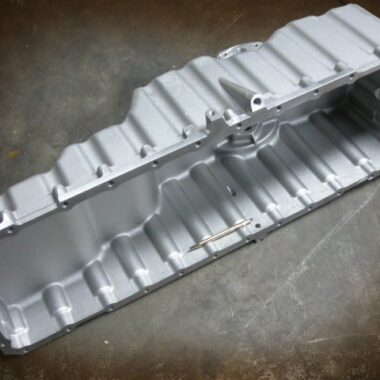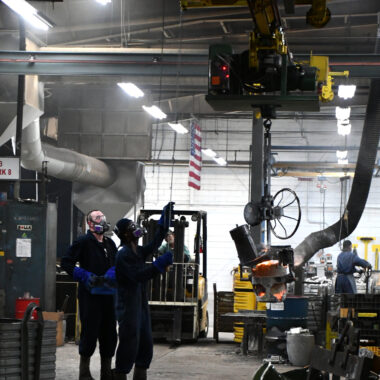Boost Your Craft: Advanced Techniques for Casting Aluminum Illinois
Boost Your Craft: Advanced Techniques for Casting Aluminum Illinois
Blog Article
Getting Quality in Light Weight Aluminum Spreading: Vital Advice
In the world of aluminum high quality, precision and spreading are paramount (casting aluminum illinois). The procedure of transforming molten light weight aluminum into intricate and sturdy parts calls for a thorough technique at every stage. From very carefully picking the ideal products to refining putting methods and making certain precise ending up touches, accomplishing quality in aluminum casting requires a blend of know-how and attention to information. As specialists in the field strive to best their craft, understanding a collection of crucial tips and methods comes to be vital. Let's check out the crucial elements that can raise light weight aluminum casting from excellent to phenomenal, setting the phase for unequaled results and unequaled workmanship.

Materials Option
Selecting the appropriate materials is vital in guaranteeing the success and top quality of your light weight aluminum casting projects. The choice of materials dramatically influences the last buildings of the casted items, consisting of toughness, toughness, and overall quality. When selecting products for aluminum spreading, it is important to consider variables such as the kind of aluminum alloy, the wanted mechanical residential properties, and the casting method being used.
Light weight aluminum alloys are frequently used in casting due to their light-weight nature and exceptional mechanical residential properties. The selection of the certain alloy relies on the application demands, with options varying from high-strength alloys ideal for architectural elements to corrosion-resistant alloys for marine settings. Recognizing the qualities of various light weight aluminum alloys is crucial for choosing the most proper one for your task.
In addition, the spreading method utilized, whether it be sand casting, die casting, or financial investment spreading, also affects product selection. Each spreading method has its own needs in terms of material fluidness, thermal conductivity, and mold and mildew compatibility. By carefully considering these elements, you can guarantee that the materials selected are customized to fulfill the details requirements of your light weight aluminum casting project.
Mold Prep Work
In the realm of aluminum spreading, the meticulous prep work of molds stands as a vital forerunner to the real casting process. It is crucial to clean the mold extensively to remove any dust, deposit, or previous spreading remnants that could jeopardize the brand-new actors.
Next, applying a suitable mold finishing is essential to facilitate the launch of the cast aluminum and improve the surface area finish of the component. The kind of finish utilized will rely on factors such as the intricacy of the mold, the desired surface area finish, and the casting product. Additionally, correct venting and gating systems must be integrated into the mold and mildew design to allow for the smooth circulation of liquified aluminum and prevent the formation of air pockets or problems in the actors component.
Melting and Pouring Methods
To achieve effective aluminum casting, mastering effective melting and pouring methods is vital for making sure accurate and top notch outcomes. The melting process is an important step in light weight aluminum spreading, where the steel is heated to its fluid state. It is necessary to keep track of the temperature level carefully to stop overheating, which can cause inadequate casting top quality. Utilizing induction heaters or gas-fired crucible furnaces can offer exact temperature level control and effective melting.
As soon as the aluminum reaches the preferred liquified state, correct pouring methods should be utilized to move the steel into the mold and mildews. The rate and consistency of the pour are essential aspects in attaining consistent filling of the mold and mildew cavity and lowering the risk of problems like try these out air entrapment or insufficient spreading. Gravity putting, low-pressure casting, or centrifugal casting approaches can be utilized based upon the particular demands of the project.
Cooling and Solidification Control
Attaining specific control over the air conditioning and solidification process is important in aluminum casting to keep the honesty and top quality of the last casted products. Proper cooling and solidification control aid prevent issues such as porosity, warm tears, and shrinkage that can endanger the mechanical properties of the casted light weight aluminum parts.
One essential aspect of air conditioning and solidification control is Get More Info the design and placement of chills. Chills are metallic objects tactically placed in the mold to absorb warm quickly from specific locations of the spreading, promoting consistent solidification and minimizing the probability of defects. Additionally, managing the air conditioning rate by changing the mold and mildew's product, design, and the application of shielding coatings can affect the microstructure and mechanical residential properties of the last spreading.
Additionally, surveillance and regulating the air conditioning process through making use of thermocouples and computer simulations permit real-time changes to enhance air conditioning prices and solidification patterns. By implementing these techniques, factories can enhance the top quality and consistency of their light weight aluminum castings, fulfilling the rigid needs of different markets.
Finishing and Quality Examination
Effectively implemented ending up and high quality assessment procedures are important in making sure the total honesty and integrity of light weight aluminum spreadings, building on the careful air conditioning and solidification control methods employed during the casting process. Finishing methods such as grinding, sanding, and brightening aid remove excess material, smooth rough surface areas, and boost the spreadings' final appearance. These procedures not just improve the visual appeal yet additionally ensure dimensional precision and performance.

Final Thought
Finally, accomplishing excellence in light weight aluminum casting needs mindful factor to consider of materials choice, thorough mold and mildew preparation, exact melting and pouring methods, reliable cooling and solidification control, in addition to detailed ending up and high quality assessment procedures. By click now complying with these important suggestions and tricks, suppliers can ensure the manufacturing of high-grade light weight aluminum castings that fulfill industry requirements and customer expectations.
When selecting materials for aluminum spreading, it is important to consider factors such as the type of aluminum alloy, the preferred mechanical homes, and the casting method being made use of.
In addition, the spreading method used, whether it be sand casting, pass away spreading, or investment spreading, also affects material selection.In the realm of aluminum spreading, the precise prep work of molds stands as a critical precursor to the real casting procedure. Gravity putting, low-pressure casting, or centrifugal spreading methods can be made use of based on the particular requirements of the project.

Report this page